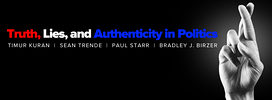Lead Essay
Democratic politics requires not only compromise, but some degree of incoherence. Politicians naturally strive to create winning coalitions, but sometimes that can mean promising the impossible or simply just the mutually incompatible. We may hate this fact, and yet it is not so clear how to do anything about it. Without a degree of compromise, democratic institutions could actually collapse. Timur Kuran argues, ultimately, that those who are willing to compromise need not be any less authentic than those who promise that they never will.
Response Essays
Every social interaction demands a sort of public performance. If we take performance and authenticity to be antithetical, then all of social life is inauthentic. And yet, says Paul Starr, that isn’t so bad. It’s probably for the best that we carefully manage our impulses while out in public, and we perhaps should not complain about politicians who carefully manage their impulses while governing. Modern politics, though, puts the business of image management front and center, with speechwriters, consultants, strategists, and the like all discussing publicly exactly how a candidate should manage his or her image. This may seem problematic, yet, as Starr argues, even the appearance of authenticity requires a good deal of artifice to sustain.
Sean Trende compares the measured, thoughtful political speeches of the mid-twentieth century to those of our own era. He finds that politicians like Everett Dirksen, or even Franklin Roosevelt, would fare badly today simply because of their highbrow rhetoric, which is no longer politically acceptable. An affected folksiness is almost a necessity nowadays. And this we call authenticity. In the Internet era, candidates must connect not only with elites, who formerly channeled both funds and votes, but also with non-elites, who are increasingly an essential donor class. Like all other donor classes, this one intends to get its money’s worth.
Bradley J. Birzer looks at some key figures from the history of liberty: What did they think of authenticity? What role did it play, for example, in republican Rome? Or at the American founding? He concludes on a pessimistic note: Our Constitution has failed, he writes, and although most people of good will are uninterested in politics, their uninterest does not yield freedom. Perhaps only a handful of politicians throughout history have failed to be corrupt, and among the American founders, not a single one believed, at the end of their lives, that the American experiment has been a success. Authentic or not, politics is concerned with grabbing ever more power, and it’s quite uninterested in anything else.
The Conversation
Coming Up
Conversation through the end of the month.
Related at Cato
Book: The Struggle to Limit Government: A Modern Political History by John Samples
Cato Unbound: ”Brain, Belief, and Politics” featuring Michael Shermer, September 2011
Cato Unbound: ”An Appreciation of Partisanship” featuring Nancy Rosenblum, February 2009
Opinion: ”Trump and Sanders: True Populists?” by Michael Tanner, National Review Online, January 2016

